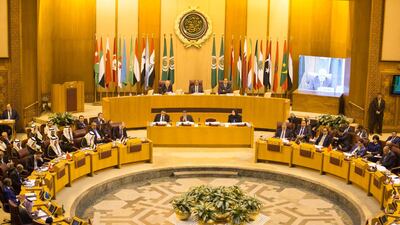Arab foreign ministers urged the US to reverse its decision to recognise Jerusalem as Israel’s capital and called on the international community to recognise a Palestinian state.
The Arab League met in Cairo on Saturday to address US president Donald Trump’s decision, which has sparked outrage and protests across the Middle East.
After an hours-long meeting, the Arab member states issued a resolution at 3am local time on Sunday that the US had “withdrawn itself as a sponsor and broker” of the Israeli-Palestinian peace process.
Member states said they would also put forward a resolution to the UN Security Council stating that the US move violated international law, adding that they would reconvene at a later date to assess the situation.
Arab League chief Ahmed Abul Gheit “denounced and condemned” Mr Trump’s Wednesday announcement to recognise Jerusalem as Israel’s capital and to move the US embassy from Tel Aviv to the disputed city.
The ministers reiterated that such a move had no legal impact and was “void”, adding: “it deepens tension, ignites anger and threatens to plunge region into more violence and chaos.”
The ministers agreed on "demanding that the United States rescind its decision on Jerusalem … and the calling on the international community to recognise the state of Palestine … with east Jerusalem as its capital,” said the statement.
____________
Read more
Jerusalem move could throw lifeline to terrorists, Mohammed bin Zayed tells US think-tank
Arab minister meet in Egypt amid anger at the US
Jerusalem retreats into fear, anger and frustration
____________
They also said that they will request the UN Security Council issue a resolution condemning the Trump administration’s decision as a violation of international law.
The Arab League statement made no mention of economic sanctions amid calls by some pro-Palestine organisations and Arab ministers — including Lebanese foreign minister Gebran Bassil.
He said that Arab countries should consider imposing economic sanctions against the US to prevent it from moving its embassy in Israel to Jerusalem — which is expected to be years-long process to relocate diplomatic operations from Tel Aviv.
"Pre-emptive measures [must be] taken … beginning with diplomatic measures, then political, then economic and financial sanctions," he said, without giving specific details.
Dr Anwar Gargash, UAE’s minister of state for foreign affairs, who took part in the emergency meeting, said: “The sterile Arab options to confront the crisis of the Jerusalem decision are a natural result of the polarisation caused by the ‘Arab Spring’. Our situation today is not pleasing, and the treatment is not simply topical.”
Meanwhile, Palestinian president Mahmoud Abbas cancelled a scheduled meeting with US vice president Mike Pence in Ramallah later this month, and his Fatah party has called on Palestinians to continue their demonstrations over Washington's police shift.
“There will be no meeting with the vice president of America in Palestine," Mr Abbas's diplomatic adviser Majdi Al Khaldi told AFP. "The United States has crossed all the red lines with the Jerusalem decision."
Egypt’s top Muslim and Christian clerics both cancelled scheduled meetings with Mr Pence, who will also visit Cairo later this month.
Israel seized Arab east Jerusalem in the 1967 Six-Day War and later annexed it in a move never recognised by the international community.
The Palestinians want the eastern sector as the capital of their future state.
The international community does not recognise the ancient city as Israel's capital, insisting the issue can only be resolved in negotiations.

